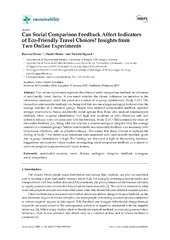Can Social Comparison Feedback Affect Indicators of Eco-Friendly Travel Choices? Insights from Two Online Experiments
Peer reviewed, Journal article
Published version

Åpne
Permanent lenke
https://hdl.handle.net/1956/15494Utgivelsesdato
2017-01-29Metadata
Vis full innførselSamlinger
Originalversjon
https://doi.org/10.3390/su9020196Sammendrag
Two online experiments explored the effects of social comparison feedback on indicators of eco-friendly travel choices. It was tested whether the chosen indicators are sensitive to the information conveyed, and if this varies as a function of in-group identification. Study 1 (N = 134) focused on unfavourable feedback (i.e., being told that one has a larger ecological footprint than the average member of a reference group). People who received unfavourable feedback reported stronger intentions to choose eco-friendly travel options than those who received nondiscrepant feedback, when in-group identification was high (not moderate or low). Perceived self- and collective efficacy were not associated with the feedback. Study 2 (N = 323) extended the focus on favourable feedback (i.e., being told that one has a smaller ecological footprint than the average member of a reference group). Neither unfavourable nor favourable feedback was associated with behavioural intentions, self- or collective efficacy. This means that Study 2 failed to replicate the finding of Study 1 that behavioural intentions were associated with unfavourable feedback, given that in-group identification is high. The findings are discussed in light of the existing literature. Suggestions are made for future studies investigating social comparison feedback as a means to motivate people to make eco-friendly travel choices.
